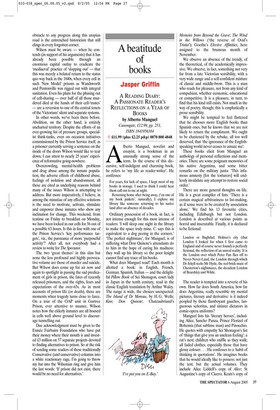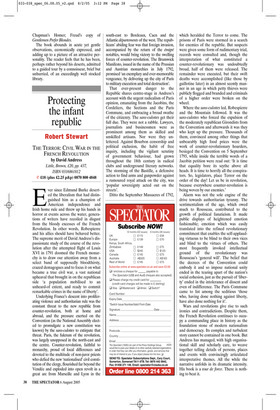A beatitude of books
Jasper Griffin
A READING DIARY: A PASSIONATE READERŌĆÖS REFLECTIONS ON A YEAR OF BOOKS by Alberto Manguel Canongate, ┬Ż12.99, pp. 253, ISBN 1841956384 Ō£å ┬Ż11.99 (plus ┬Ż2.25 p&p) 0870 800 4848 Alberto Manguel, novelist and essayist, is a bookman in an unusually strong sense of the term. In the course of this discursive, self-indulgent and charming book, he refers to ŌĆśmy life as reader-writerŌĆÖ. He confesses:
For years, for lack of space, I kept most of my books in storage. I used to think I could hear them call out to me at night.
Returning home after being away, (ŌĆśon one of my book junketsŌĆÖ, naturally), I explore my library like someone returning to his native land after an absence of decades.
Ordinary possession of a book, in fact, is not intense enough for this most intense of readers: ŌĆśI will sleep one night in the library to make the space truly mine. C. says this is equivalent to a dog peeing in the corners.ŌĆÖ ŌĆśThe perfect nightmareŌĆÖ, for Manguel, is of suffering what Don QuixoteŌĆÖs attendants do to him in the hope of curing his madness: they wall up his library so the poor knight cannot find any trace of his books.
What does Manguel read? Each month is allotted a book: in English, French, German, Spanish, Italian ŌĆö and the delightful Pillow Book of Sei Shonagon, court lady in Japan in the tenth century, read in the classic English translation by Arthur Waley. The range is wide, the choices unexpected: The Island of Dr Moreau, by H. G. Wells; Kim; Don Quixote; ChateaubriandŌĆÖs Memoirs from Beyond the Grave; The Wind in the Willows (ŌĆśthe reverse of OvidŌĆÖs TristiaŌĆÖ); GoetheŌĆÖs Elective Affinities, here assigned to the brumous month of November.
We observe an absence of the trendy, of the theoretical, of the academically impressive. We observe, in fact, something not very far from a late Victorian sensibility, with a very wide range and a self-confident mixture of classic and middle-brow. This is a man who reads for pleasure, not from any kind of compulsion, whether economic, educational or competitive. It is a pleasure, in turn, to find that his kind still exists. Not much in the way of poetry, though; this is emphatically a prose sensibility.
We might be tempted to feel flattered that he chooses more English books than Spanish ones, but he knows that we are not likely to return the compliment. We ought to be chastened by the rebuke, all too well deserved, that ŌĆśthe ignorance of the Englishspeaking world never ceases to amaze meŌĆÖ.
These books elicit from Manguel an anthology of personal reflections and memories. There are some poignant memories of his native Argentina, and some bitter remarks on the military junta: ŌĆśThis infamous amnesty [for the torturers] will endlessly invalidate any attempt to restore social order.ŌĆÖ There are more general thoughts on life. He is a great compiler of lists: ŌĆśThere is a certain magical arbitrariness to list-making, as if sense were to be created by association alone.ŌĆÖ We find his 13 favourite cities, including Edinburgh but not London. London is described at various points as horrid and inscrutable. Finally, it is declared to be fictional:
London or Baghdad, HolmesŌĆÖs city (that London I looked for when I first came to England and of course never found) is perfectly fictional, the reflection of an unreal reality. It is the London over which Peter Pan flies off to Never-Never-Land, the London through which Dr Jekyll seeks Mr Hyde, the red-brick maze of ChestertonŌĆÖs nightmares, the decadent London of Beardsley and Wilde.
The reader is tempted into a reverie of his own. How far does South America, how far does Argentina, really resemble my mental pictures, literary and derivative: is it indeed peopled by those flamboyant gauchos, languorous se├▒oritas, and sinister dictators in comic-opera uniforms?
Manguel lists his ŌĆśliterary heroesŌĆÖ, including Alice, Sancho Panza, Prince Florizel of Bohemia (that sublime man) and Pinocchio. He quotes with empathy Sei ShonagonŌĆÖs list of ŌĆśthings that give you an unclean feelingŌĆÖ: a ratŌĆÖs nest; children who sniffle as they walk; all faded clothes, especially those that have glossy colours ... He confesses to a ŌĆśhabit of thinking in quotationsŌĆÖ. He imagines books that he would ideally like to possess: not just the text, but the actual volumes. They include Alice LiddellŌĆÖs copy of Alice; St AugustineŌĆÖs copy of Cicero; KeatsŌĆÖs copy of ChapmanŌĆÖs Homer; FreudŌĆÖs copy of Gentlemen Prefer Blondes.
The book abounds in acute yet gentle observations, economically expressed, and adding up to a picture of an attractive personality. The reader feels that he has been, perhaps rather beyond his deserts, admitted to a guided tour by a connoisseur, brief but unhurried, of an exceedingly well stocked library.












































 Previous page
Previous page